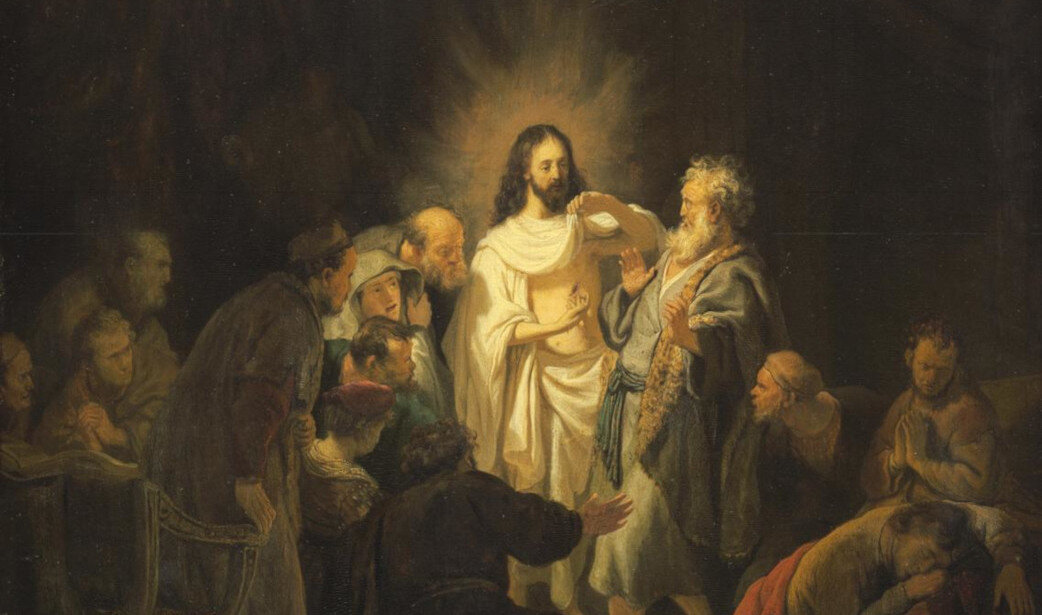The Great Commission in John
On the evening of that first day of the week, when the disciples were together, with the doors locked for fear of the Jewish leaders, Jesus came and stood among them and said, “Peace be with you!” After he said this, he showed them his hands and side. The disciples were overjoyed when they saw the Lord.
Again Jesus said, “Peace be with you! As the Father has sent me, I am sending you.” And with that he breathed on them and said, “Receive the Holy Spirit. If you forgive anyone’s sins, their sins are forgiven; if you do not forgive them, they are not forgiven.” John 20: 19-23
It’s the Sunday following Good Friday and Jesus’ disciples are meeting behind locked doors. The doors are bolted because they are still afraid that the same Jewish authorities who came for Jesus will come for them. Ten of the Twelve are present along with other disciples (Lk 24:36) when Jesus stood among them and said, “Peace be with you!”
Peace is the common Jewish greeting but it means so much more than “hello”. Shalom refers to the peace that only God brings—the peace of salvation, the peace of restored relationships. In Jesus’ hour of need they deserted him, now Jesus brings them peace, forgiveness and a new beginning.
He showed them the wounds on his hands and in his side, he is no ghost. The crucified Jesus is the risen Lord. Their fear turned to joy.
Jesus will return to the Father, his mission accomplished. He has come to Jesus commission his disciples as he was commissioned by the Father: “As the Father has sent me, I am sending you.” This is a reminder of his earlier prayer for them, “As you sent me into the world, I have sent them into the world” (17:18). Their mission begins, or better still, his mission continues through them.
Jesus was sent into the world by the Father to do his will (6:38-39; 8:29), to speak his words, to perform his works (4:34; 5:36; 9:4) and win salvation for all who believe (3:16-17). At the heart of Jesus’ mission was his obedience and dependence on the Father, who set him apart and poured out the Holy Spirit upon him (1:32; 3:34; 4:34; 5:19; 6:27; 10:36; 17:4). Through Jesus, his disciples have become the children of God, the Spirit has been promised to them, they have been made holy by God’s word as they grow in obedience and dependence on their Lord (1:12–13; 3:3, 5; 14-16; 17:17; 20:17).
By remaining in his love, disciples are to become obedient to the Son as the Son is obedient to the Father. Loving obedience is the fruit of salvation. The Father sent the Son so that all who believe in him might have eternal life and be set free from slavery to sin (1:12-13; 3:16; 8:34-36.) As in Matthew, their mission it is to teach others to obey all that Jesus has commanded (Matt 28:20).
When he was with them, Jesus urged his disciples to lift up their eyes and see the fields are ripe for harvest (4:35-38). He told them that those who believed in him would one day do even greater works than he had done (14:12). He chose them and appointed them to bear fruit that would last (15:16).
The disciples do not replace Jesus or take over his mission. Seated at the right hand of the Father, Jesus now continues his mission through his disciples in the power of the Holy Spirit (14:12-14).
Having commissioned them, Jesus breathed on them and said, “Receive the Holy Spirit.” This reminds us of when God formed the man from the dust of the earth and breathed life into him, and he became a living being made in the image of God (Gen 2:7). It also recalls Ezekiel’s vision of the people of God as a valley of dry bones, without hope until the Lord breathed on them, and they came to life as a vast army (Ez 37:5-14). Jesus is the one who gives the Spirit without limit (3:34).
In John 14-17, Jesus promised that when he ascended to the Father, he would send the Holy Spirit who will never leave them. Jesus promised to come to them in the person of the Holy Spirit and lead them into all truth. The Spirit is not given to the world but given to Jesus’ disciples that they may bear witness to him.
Their mission in the power of the Spirit is the offer to the world of the forgiveness of sins in Jesus’ name. The authority to forgive sins or withhold forgiveness doesn’t reside in Jesus’ disciples. They have the power to proclaim forgiveness. As the disciples share the good news about Jesus, God will forgive the sins of those who believe. Everyone who looks to the Son and believes in him will have eternal life (6:40). Whoever rejects the offer of forgiveness will remain under God’s judgment (9:39.)
In all the accounts of Jesus’ commission to his disciples, the same themes recur — the crucified Jesus is the risen conquering Lord whose mission continues through his disciples in the power of the Holy Spirit. They are to take the good news about Jesus to the world proclaiming the forgiveness of sin in his name. As people turn to him in faith they are united with him and welcomed into the same relationship of love and surrender that Jesus has with the Father.
The Great Commission in Matthew
Sources



